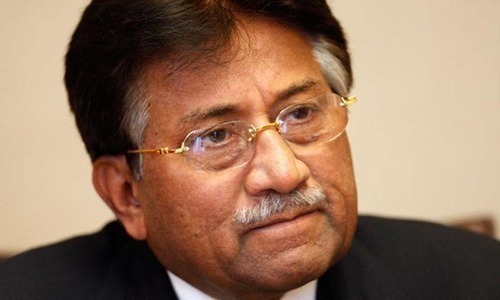It has proved, in the end, to be a damp squib. What once began as a historic treason trial, either radically altering the civil-military imbalance or shaking the foundations of democracy in the country, is now all but over in name.
A sheepish Interior Minister Nisar Ali Khan told the media last night that his government will allow retired Gen Pervez Musharraf to travel abroad on the latter’s firm assurance that he will return to Pakistan after several weeks. Not even the interior minister could pretend that Mr Musharraf’s return is likely.
Instead, Mr Khan tried to explain why his government’s hands were tied. Never mind that the Supreme Court itself had made clear that both the federal government and the special tribunal were well within their rights to prohibit Mr Musharraf from travelling abroad.
The government had tried to pass the buck to the Supreme Court and when the Supreme Court returned it firmly, the PML-N apparently had nothing left to offer. Surrender has come rather meekly.
There remains the possibility that Mr Musharraf may in fact return to Pakistan. But even if he does, the government has surely already signalled the end of its prosecution of the former dictator.
If the fate of Mr Musharraf seems relatively clear now, there are two other questions that remain to be answered. First, what was Prime Minister Nawaz Sharif thinking when he decided to pursue Mr Musharraf for treason?
From the very outset, there appeared to be no real strategy. In choosing to go after Mr Musharraf for the November 2007 emergency and not the 1999 coup, perhaps the prime minister was trying to make the overtly personal seem less so. In addition, there may have been legal advice that the original coup of Mr Musharraf was later sanctified by parliament and therefore more difficult to prosecute.
Yet, none of that could resolve the obvious political contradiction: if the first coup was not worthy of prosecution, then what did a short-lived imposition of emergency matter, especially if it led to the eventual ouster of Mr Musharraf and the reinstatement of Iftikhar Chaudhry?
Pakistan needs a reckoning with its military past. But justice must be done transparently, rationally and for the greater good. Prime Minister Sharif’s prosecution of Mr Musharraf always seemed more in line with persecution.
Second, what now of the civil-military imbalance? Increasingly, it appears that the prime minister has accepted the de facto normalisation of military control as the price for democratic continuity.
Published in Dawn, March 18th, 2016













































